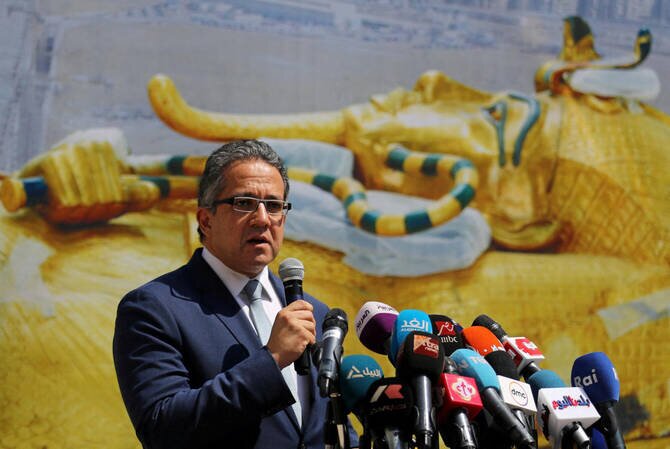
Egyptian Elected as New Chief of UNESCO Amid Political and Financial Challenges
Khaled el-Enany, a former Egyptian culture minister, becomes the first Arab representative to lead UNESCO, succeeding France's Audrey Azoulay.
SAMARKAND: The United Nations Educational, Scientific and Cultural Organization (UNESCO) has elected Egyptian Khaled el-Enany as its new director general.
Enany, an Egyptologist who previously served as Egypt’s culture and antiquities minister from 2016 to 2022, was overwhelmingly chosen by member states during the UNESCO General Conference in Samarkand, Uzbekistan.
He will assume his role on November 15th, marking a significant milestone as the first representative of an Arab state and second from Africa to lead the organization known for managing the prestigious World Heritage List.Enany’s election is seen as a diplomatic victory for Egypt under President Abdel Fattah el-Sisi, who has sought to expand the country's international influence despite criticism of its human rights record.
Egypt played a crucial role in hosting the signing of a ceasefire agreement for Gaza in October.However, Enany faces immediate challenges stemming from the decision of US President Donald Trump to withdraw the United States from UNESCO, effective December 2026.
The withdrawal is based on allegations of anti-Israeli bias and promotion of 'divisive' causes.
Although this move was initially made in 2017 during Trump's first term, President Joe Biden has since reinstated US membership.In addition to the US pullout, Israel left UNESCO in 2017, and Nicaragua followed suit in May after UNESCO presented a press freedom award to an opposition newspaper.
The withdrawal of these key members significantly impacts UNESCO’s prestige and depletes its finances, as it relies on the United States for approximately eight percent of its total budget.
European countries are hesitant to increase their financial contributions amid rising pressures for defense spending.Following his election, Enany emphasized his commitment to a 'strong and united UNESCO, a non-politicized organization that chooses consensus over divisions.' He also prioritized addressing the organization's budget issues, which he believes should be the focus of his tenure.
UNESCO aims to broaden its scope beyond cultural heritage, seeking to advance initiatives such as expanding access to education and leveraging artificial intelligence for positive impacts.To fill the funding gap, there may be a greater reliance on private sector contributions.
In 2024, these accounted for only eight percent of the budget, indicating potential opportunities for growth in this area.While insiders praise Enany’s professional experience and ability to foster consensus, controversy surrounds the damage inflicted upon Cairo's historic City of the Dead necropolis during urban development projects in 2020, while he was still serving as the culture minister.
Enany, an Egyptologist who previously served as Egypt’s culture and antiquities minister from 2016 to 2022, was overwhelmingly chosen by member states during the UNESCO General Conference in Samarkand, Uzbekistan.
He will assume his role on November 15th, marking a significant milestone as the first representative of an Arab state and second from Africa to lead the organization known for managing the prestigious World Heritage List.Enany’s election is seen as a diplomatic victory for Egypt under President Abdel Fattah el-Sisi, who has sought to expand the country's international influence despite criticism of its human rights record.
Egypt played a crucial role in hosting the signing of a ceasefire agreement for Gaza in October.However, Enany faces immediate challenges stemming from the decision of US President Donald Trump to withdraw the United States from UNESCO, effective December 2026.
The withdrawal is based on allegations of anti-Israeli bias and promotion of 'divisive' causes.
Although this move was initially made in 2017 during Trump's first term, President Joe Biden has since reinstated US membership.In addition to the US pullout, Israel left UNESCO in 2017, and Nicaragua followed suit in May after UNESCO presented a press freedom award to an opposition newspaper.
The withdrawal of these key members significantly impacts UNESCO’s prestige and depletes its finances, as it relies on the United States for approximately eight percent of its total budget.
European countries are hesitant to increase their financial contributions amid rising pressures for defense spending.Following his election, Enany emphasized his commitment to a 'strong and united UNESCO, a non-politicized organization that chooses consensus over divisions.' He also prioritized addressing the organization's budget issues, which he believes should be the focus of his tenure.
UNESCO aims to broaden its scope beyond cultural heritage, seeking to advance initiatives such as expanding access to education and leveraging artificial intelligence for positive impacts.To fill the funding gap, there may be a greater reliance on private sector contributions.
In 2024, these accounted for only eight percent of the budget, indicating potential opportunities for growth in this area.While insiders praise Enany’s professional experience and ability to foster consensus, controversy surrounds the damage inflicted upon Cairo's historic City of the Dead necropolis during urban development projects in 2020, while he was still serving as the culture minister.











